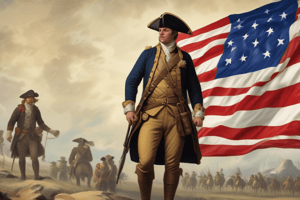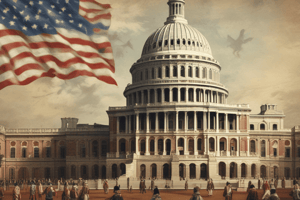Podcast
Questions and Answers
What were the three radical principles put forth in the Declaration of Independence?
What were the three radical principles put forth in the Declaration of Independence?
- Separation of Powers, Federalism, and Checks and Balances
- Equality, Social Contract, and Revolution
- Democracy, Autocracy, and Socialism
- Life, Liberty, and the Pursuit of Happiness, Natural Rights, and Right to Rebel (correct)
What was the main purpose of the list of grievances against King George III in the Declaration of Independence?
What was the main purpose of the list of grievances against King George III in the Declaration of Independence?
- To establish a new government
- To convince the colonists and European powers that the break with Great Britain was necessary and justified (correct)
- To propose a treaty with Great Britain
- To declare independence from Great Britain
What was the significance of the Declaration of Independence in the American Revolutionary War?
What was the significance of the Declaration of Independence in the American Revolutionary War?
- It ended the war immediately
- It provided a rallying point for the colonists to move forward (correct)
- It discouraged the European powers from supporting the colonists
- It established a new government
What was the outcome of the War for Independence (American Revolutionary War)?
What was the outcome of the War for Independence (American Revolutionary War)?
What did the colonial delegates at the Second Continental Congress encourage the legislative assembly of each colony to write?
What did the colonial delegates at the Second Continental Congress encourage the legislative assembly of each colony to write?
Flashcards are hidden until you start studying
Study Notes
Second Continental Congress (1775-1781)
- Convened on May 10, 1775, with delegates elected by colonial legislatures or correspondence committees
- Functioned as an independent government, preparing for war with Britain
- Appointed George Washington to command the Continental Army
- Petitioned King George III to end hostile actions against the colonists in July 1775, but the king refused
Thomas Paine's Common Sense
- Published in January 1776, transforming wavering colonists into revolutionary patriots
- Argued that war with Great Britain was necessary and unavoidable for achieving independence and civil and religious liberty
Declaration of Independence
- Proposed by Richard Henry Lee in May 1776, asserting that the united colonies should be free and independent states
- Led to the establishment of a committee to write a formal declaration of independence
- Thomas Jefferson drafted the Declaration, which was unanimously endorsed by the Second Continental Congress on July 4, 1776
- Groundbreaking document that put forth three radical principles:
- All men are equal, with natural rights (life, liberty, and the pursuit of happiness)
- Governments must be based on the consent of the people they serve
- People have the duty to abolish and create a new government if it doesn't protect their rights
- Listed grievances against King George III to justify the colonists' break with Great Britain
War for Independence and New Government
- The American Revolutionary War began at Lexington and Concord in 1775 and ended with the signing of a peace treaty in Paris in 1783
- Before the war's end, the colonists established new governments, encouraged by the Second Continental Congress
- Each colony's legislative assembly was encouraged to write a constitution establishing natural rights
Studying That Suits You
Use AI to generate personalized quizzes and flashcards to suit your learning preferences.




